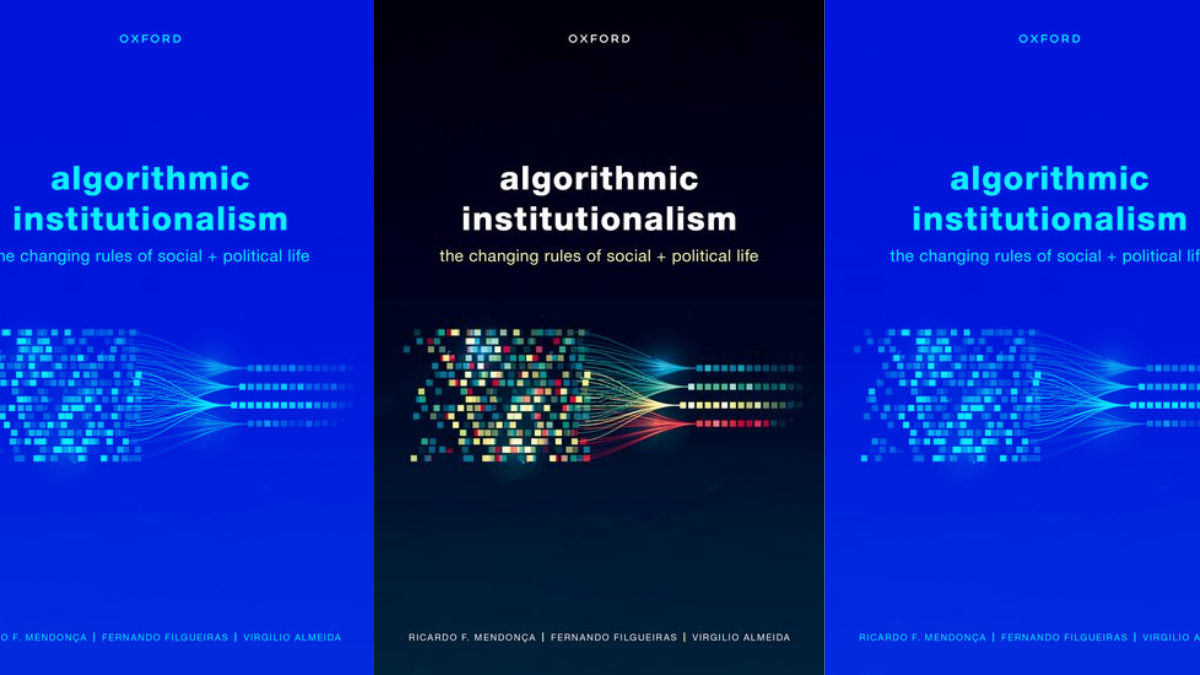Book Review- Algorithmic Institutionalism: The Changing Rules of Social and Political Life
Edesio Fernandes / May 23, 2024Edesio Fernandes reviews Algorithmic Institutionalism: The Changing Rules of Social and Political Life by Ricardo F. Mendonca, Fernando Filgueiras, and Virgílio Almeida, Oxford University Press, 2024.
One of the most important features of contemporary life is the growing gap between the nature of social, political, and environmental processes and the political-legal-institutional processes that aim to regulate them, determining the rules of the social contract, especially concerning supranational questions that have increasingly affected global society. The paradox is undeniable and deeply problematic.
On the one hand, the manner in which laws, public policies, and institutional actions have treated (when they have not also directly or indirectly created and fomented) socioeconomic processes of inequality, segregation, exclusion and environmental injustice in their diverse manifestations across the world, has already led to a growing social distrust of legal and political institutions, especially those of democratic nation states. Separatist movements; the rupture of economic blocs; social, urban and rural conflicts; pressure for the adoption of varied strategies of privatization, etc: these are the expressions of the profound and widespread crisis of political governance and the threat of a rupture of the social contract that is enabling the advance of populist mandates and even the clamor for authoritarian regimes. At various national, regional, and local levels, a popular sentiment has grown to affirm that traditional institutions are controlled by, and serve, the most powerful political groups as well as economic, financial, and landowning elites.
On the other hand, despite political pressure in several contexts for political and administrative decentralization, and regardless of demands for localism, it is undeniably at the global level that the most critical processes that have directly and strongly affected contemporary society have taken place. This includes economic and financial globalization, including the wide circulation of capital, goods and workers (albeit in that case through largely disputed immigration processes), to political and territorial conflicts, disasters, health crises, and climate change. The fact is that there are no global institutions that can effectively regulate and intervene with authority in these processes – which thus remain at the mercy of individual and fragmented decisions by national governments, many of which are in crisis, and which cannot be resolved by the private sector alone. There is widespread disbelief about the efficacy and even the legitimacy of global institutions, which are frequently associated with the interests of certain countries and more powerful economic interests.
In this context, the consolidation of capitalism (especially financial and speculative capitalism), the absurd concentration of wealth and the consequent deepening of social inequalities have raised doubts regarding the possibility of traditional democratic institutions, even if they are renewed and widened, to cope with pressing social and collective needs in a world threatened by the alarming implications of climate change. Democracy as a system of social organization and the distribution of political power is in question, especially regarding its capacity to create a fairer and more sustainable order that expresses the values and meets the needs of communities more than the interests of individuals and groups.
This overall order is a reality gradually formed especially throughout the last century. Now, the impressive advance of technology over the last few decades has introduced a new gap between the “physical life” and the “digital life.” Several relatively recent products and services – from the personal computer to the Internet to cellular telecommunication – have already profoundly transformed the ways people live, work, produce, consume, communicate, establish relationships, and have access to varied public and private services. The recent COVID-19 pandemic and lockdowns have consolidated, and seemingly made irreversible, many of the changes that were already happening beforehand. In many ways, technology has led to even deeper changes in the social order than traditional public policies, creating diverse obligations, determining responsibilities, and distributing possibilities – all through obscure processes which are hardly participatory and without any concern for public or democratic accountability.
With the state apparatus hijacked by the private sector, and given the growing power of a few tech companies, the fragile democratic order has become even more threatened. Many technological advances have deeply affected individual freedoms and guarantees, especially the central democratic notion of privacy – not only through the action of governments and Big Tech companies, but also through a series of commercially available products such as security cameras, facial recognition, artificial intelligence, and other invasive surveillance systems that have been regularly used against journalists and dissidents. The feeling has grown that, in their search for hegemonic power, governments and especially technological companies have trodden over the democratic field of individual freedoms and guarantees, as a result of decision-making processes which are increasingly more obscure, more restricted, and are further and further from society’s understanding and reach.
The variables that form this scenario represent an explosive combination when combined with the catalysts of misinformation, fake news, fraud, and the sophisticated manipulation of electoral processes, rendering illusory any notion of transparency. In a year in which a record percentage of people should participate in elections around the world, for many a strong cloud of suspicion hangs over many such processes. For those that wish to delegitimize democratic elections, technology is a tool to grab power to the exclusion of society while maintaining the illusion of legitimacy for a profoundly rigged social contract.
In this complex context, the word of the times – increasingly more employed, although not greatly understood – is certainly “algorithms.” Algorithms are sequences of executable instructions to achieve certain objectives, and which, especially in the context of AI, are increasingly present in applications that run through people’s everyday lives, directly and indirectly affecting countless decisions, from the simplest to the most complex, including the execution of public policies and delivery of services. As they take into account an enormous amount of information and data, algorithmic systems have generally been promoted as impersonal, objective, and neutral solutions that allow for a more efficient and faster use of resources, especially private and public financial resources.
However, there is already a tradition of critical studies indicating that, regardless of their advantages, these systems have actually deepened inequalities, exacerbated polarization, infringed copyrights, reinforced prejudices and consolidated injustices, including on race and gender. How can it be guaranteed that technological advances serve to effectively promote social progress, facilitating inclusion and the fairer distribution of resources – and not reduced to yet another form of exploitation and domination?
It is in this context of great challenges, serious concerns, and still unanswered questions that an original and stimulating book by Professors Ricardo F. Mendonça, Fernando Filgueiras and Virgílio Almeida was published. Combining the approaches of both political science and computer science, the authors propose a fascinating and provocative argument: algorithms are emerging global institutions in contemporary society, as they operate as a set of rules that structure the contexts in which people and machines co-exist and interact. Influencing individual behaviors and provoking collective consequences, algorithms end up creating a new political order based on the rationalization of computer systems – and as such they are like laws that generate rights, obligations, responsibilities, and possibilities. But, in most cases, they do not pass through the same decision-making process intrinsic to the democratic system. Who decides and how, who participates and how, who controls and how… these central questions of the democratic process are unanswered.
The book provides a detailed analysis of three cases in which algorithms have been widely used: public security policies; redesign and integration of governmental platforms; and the construction of recommendation systems in several fields. The authors stress how institutions should urgently incorporate the study of algorithms – and vice-versa. They argue that it is fundamental to advance towards the democratization of algorithms so as to contain several forms of risk that they potentially create for the political governance of contemporary society.
Whether people are aware or not, the fact is that algorithms have created new power relations, influencing and even determining how people participate in the public sphere and in social life – thus also creating new problems and new forms of injustice. For the authors, the challenge of democratizing algorithms requires the renewed critique of existing institutions, as well as a renewed and continuous process in which algorithms are explicitly inserted in the overall political dynamics and guided by democratic values of participation, equality, pluralism, public debate, accountability, and liberty.
The book makes an attractive and necessary argument, as we must all urgently search for the best ways to adapt to a world that is undergoing such rapid and intense processes of combined changes – while at the same time we have to try to politically re-qualify such decision-making processes to render them more inclusive and sustainable. To start with, the biggest challenge may be to bring the “digital world” closer to the “physical world” in a concrete manner, as the combination of growing labor precarity (in no small part resulting from technological advances), housing precarity, and wealth concentration have already generated an alarming process of digital exclusion. The impressive mobile telecommunications revolution has certainly allowed many of the poorest people to more easily bypass the bottlenecks of the traditional communications infrastructure, but access to the digital world requires much better economic conditions, as well as financial and educational capacity. In this analysis, democratizing the new institution of algorithms requires also fully democratizing old national institutions while creating new institutions at the global level that can enable participatory, plural, legitimate, and efficient forms of governance that make possible the promotion of profound changes in the socioeconomic and environmental orders of a world in peril.
This is an excellent book that makes us think and that offers us an excellent signaling framework for the navigation of the challenging journey ahead.
Authors

